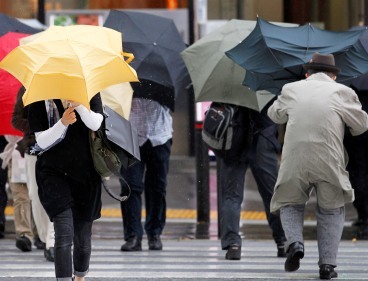Japanese researchers on Friday unveiled a population clock that showed the nation's people could theoretically become extinct in 1,000 years because of declining birth rates.

Academics in the northern city of Sendai said that Japan's population of children aged up to 14, which now stands at 16.6 million, is shrinking at the rate of one every 100 seconds.
Their extrapolations pointed to a Japan with no children left within a millennium.
"If the rate of decline continues, we will be able to celebrate the Children's Day public holiday on May 5, 3011 as there will be one child," said Hiroshi Yoshida, an economics professor at Tohoku University.
"But 100 seconds later there will be no children left," he said. "The overall trend is towards extinction, which started in 1975 when Japan's fertility rate fell below two."
Yoshida said he created the population clock to encourage "urgent"
discussion of the issue.
Another study released earlier this year showed Japan's population is expected to shrink to a third of its current 127.7 million over the next century.
Government projections show the birth rate will hit just 1.35 children per woman within 50 years, well below the replacement rate.
Meanwhile, life expectancy -- already one of the highest in the world -- is expected to rise from 86.39 years in 2010 to 90.93 years in 2060 for women and from 79.64 years to 84.19 years for men.
More than 20 percent of Japan's people are aged 65 or over, one of the highest proportions of elderly in the world.
Japan has very little immigration and any suggestion of opening the borders to young workers who could help plug the population gap provokes strong reactions among the public.
The graying population is a headache for policymakers who are faced with trying to ensure an ever-dwindling pool of workers can pay for a growing number of pensioners.
But for some Japanese companies the inverting of the traditional ageing pyramid provides commercial opportunities.
Unicharm said Friday that sales of its adult diapers had "slightly surpassed" those for babies in the financial year to March, for the first time since the company moved into the seniors market.
Unicharm started selling diapers for babies in 1981 and those for adults in 1987, said spokesman Kazuya Kondo, who declined to give specific figures on the sales.
Yoshida's population clock can be seen at: http://mega.econ.tohoku.ac.jp/Children/ (AFP)
<관련 한글 기사>
충격! 일본인 멸종설! 그렇다면 한국은?
일본의 저출산 추세가 지속된다면 3011년에 마지막 신생아가 태어나고 그로부터 몇 세대후에 일본인이 사실상 사라질 것이라는 연구결과가 나왔다고 미국의 뉴스전문 채널 폭스뉴스가 11일(현지시간) 보도했다.
보도에 따르면 대지진에 따른 쓰나미 피해를 겪은 센다이의 연구진은 일본의 14 세 미만 어린이 인구는 1천660만 명이며 100초에 한 명 꼴로 줄어들고 있는 것으로 추산했다.
이런 추세가 계속된다면 일본에서는 1천년 이내에 어린이가 한 명도 남지 않게 되는 셈이다.
또다른 연구결과는 현재 1억2천700만 명인 일본의 인구가 앞으로 1세기에 걸쳐 3분의 1가량 줄어들 것으로 예견한다.
학자들은 이와 같은 인구 감소세에 경종을 울리기 위해 '인구시계'를 만들기도 했다.
일본의 출산이 이처럼 저조한 것은 양육과 교육에 드는 비용이 지나치게 많기 때문이기도 하지만 젊은이들이 결혼이나 섹스에 무관심하다는 점도 이유로 지적되고 있다고 폭스뉴스는 전했다.
국립사회보장ㆍ인구문제연구소의 연구결과 30대 미혼 남녀 4 명 가운데 한 명은 한번도 성행위를 해본 적이 없는 것으로 나타났다.
미혼 남성 중 60% 이상은 여자친구가 없고 여성 가운데 50% 가까이도 데이트를 하고 있지 않다고 답변했다.
또 일본가족계획협회의 조사에서는 16~19세의 남성 가운데 36%가 '섹스에 관심이 없다'고 밝혔다.
일본의 인구 감소와 고령화는 정부가 국제안보보다는 헬스케어에 우선순위를 두도록 함으로써 국제정세에도 영향을 미칠 것이라고 폭스 뉴스는 분석했다.
한편 한국 역시 2011년에 1.24명의 출산율을 기록하며 OECD국가 가운데서 최하위 수준을 기록하고 있어 이러한 우려에서 자유롭지 못한 것으로 드러났다. 지난 2005년에는 1.08명으로 역대 최저수치를 기록한 바 있다.





![[Herald Interview] 'Amid aging population, Korea to invite more young professionals from overseas'](http://res.heraldm.com/phpwas/restmb_idxmake.php?idx=644&simg=/content/image/2024/04/24/20240424050844_0.jpg&u=20240424200058)











![[KH Explains] Korean shipbuilding stocks rally: Real growth or bubble?](http://res.heraldm.com/phpwas/restmb_idxmake.php?idx=652&simg=/content/image/2024/04/25/20240425050656_0.jpg&u=)

